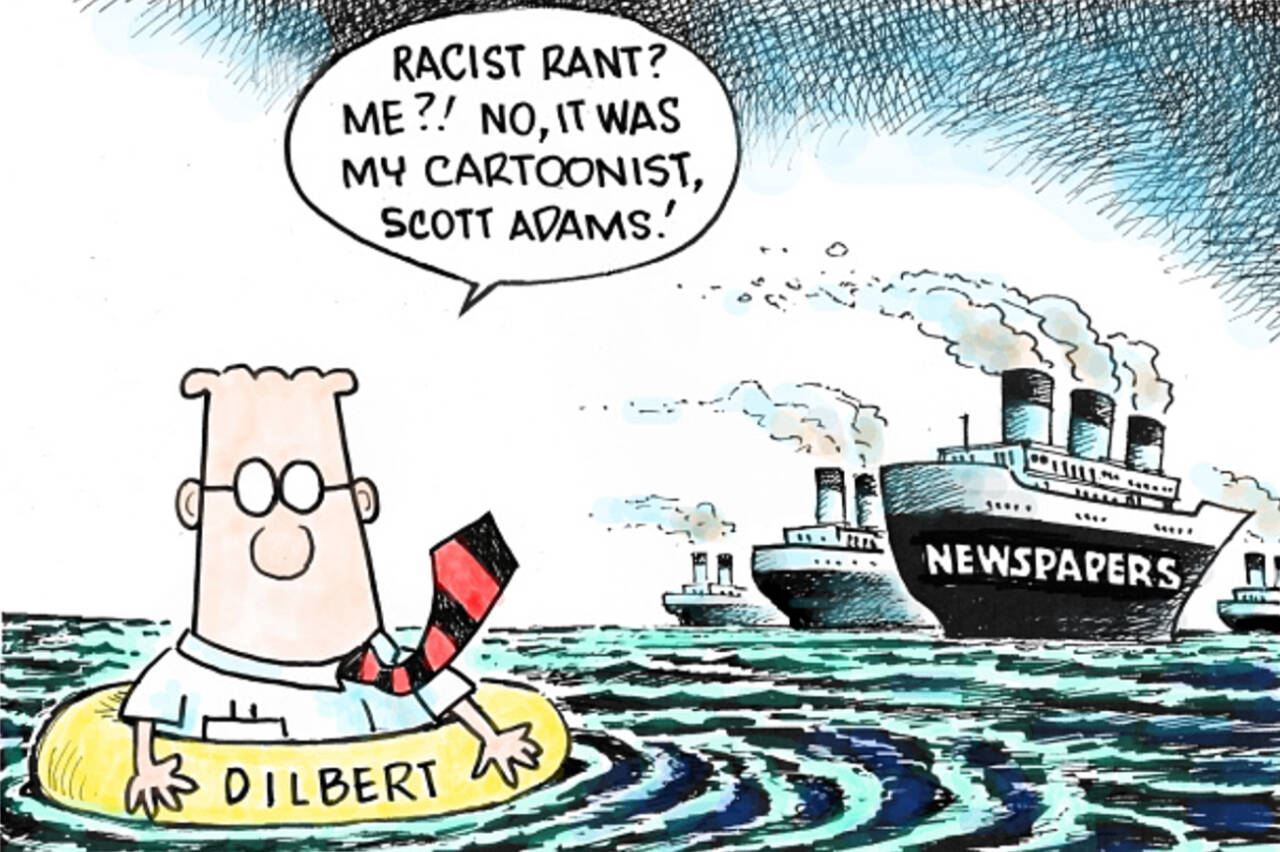By The Herald Editorial Board
Joining a ever-growing list of newspapers — and even the cartoonist’s own distributor — The Daily Herald has elected to drop Scott Adams’ comic “Dilbert” from its weekend comic section over recent comments that Adams made on a YouTube show that referred to Black people as a “hate group” and advised white people to “get the hell away from Black people.”
Because our weekend comics are printed in advance, the section for the March 4 Herald — which includes what will be the comic’s final run — already has been printed and will go out with next weekend’s edition. The Herald is working with the distributor, Andrews McMeel Universal, which has also dropped the comic from its lineup, to find a replacement by March 11. The Daily Herald has not published the daily version of the strip for several years.
Adams’ comments on their surface are disturbing and are fully deserving of the distance that this newspaper and others are now putting between themselves and Adams and his work. After some 250 years of chattel slavery, another 100 years of racist Jim Crow laws and societal inequality and about 60 years of a mixed record of addressing the preceding centuries’ racial injustices — the accusation that even a minority of Black people are a hate group cannot go unchallenged.
Even if those opinions are not expressed within the panels of the comic itself — and Adams may have been toying around the edges of those sentiments in his strip in recent years — the author’s statements are reason enough not to further promote him or his work.
Even providing the context around his comments, as he has attempted to use as a defense, provides no satisfying justification. But here’s the context:
Adams, in a YouTube show last Wednesday was reacting to a recent poll by Rasmussen Reports that asked 1,000 American adults, “Do you agree or disagree with this statement: ‘It’s OK to be white.” Rasmussen reported that of Black respondents in the poll, 53 percent agreed with the statement, 26 percent disagreed and 21 percent were not sure.
Adams response: “If nearly half of all Blacks are not OK with White people … that’s a hate group. I don’t want to have anything to do with them. And I would say, based on the current way things are going, the best advice I would give to White people is to get the hell away from Black people … because there is no fixing this.”
Adams appears to be using the poll — inaccurately and without bothering to think for a moment — to prop up and defend his existing prejudices.
Rasmussen, according to an analysis by The Washington Post’s Phillip Bump, is known as a conservative-leaning polling firm that has shifted its focus toward culture war fights in recent years, including the notion that white people face discrimination and racism equal to or worse than that faced by Blacks and other non-white groups.
The poll question itself — agree or disagree: it’s OK to be white — is loaded language and begs for responses that would allow greater explanation and a spectrum of agreement than the poll was designed to allow. Unlikely to generate any insight or helpful discussions on race, the poll question instead lends itself only to the racial animosity that it so easily triggered in Adams and likely others. To conclude from the poll that nearly half of all Blacks are “a hate group” and that all Blacks should be avoided, that’s racism seeking validation.
Some readers may fault The Herald and other newspapers for not respecting Adams’ First Amendment right to free speech or canceling him and his strip for something that was not included in the “Dilbert” strip. The opposite is true; The Herald is using its First Amendment right to publish that which it believes is of value and of use to our readers and to exclude that which isn’t.
Four years ago this month, The Herald pulled a popular Sunday comic strip, “Non Sequitur” by Wiley Miller, because of text scribbled in the margins of an otherwise innocuous cartoon that looked to some as if it contained a vulgarity directed at then-President Donald Trump. Although barely legible, the intent was clear, and was included in the comic without advance notice to The Herald or other newspapers. That decision, too, was The Herald’s to make under its First Amendment rights. Miller broke the trust of The Herald, as Adams now has.
Adams, in the days during this controversy, has made no attempt to apologize for his statements; just the opposite.
He has engaged in the all-too-common practice of late of doubling down on absurd, vitriolic and divisive statements, using his lack of shame as a badge of courage. There’s no courage there, just the unspoken realization that the vast majority of Americans find his statements — and those of others like him — repulsive and not worth the newsprint they’re printed on.
Talk to us
> Give us your news tips.
> Send us a letter to the editor.
> More Herald contact information.

























